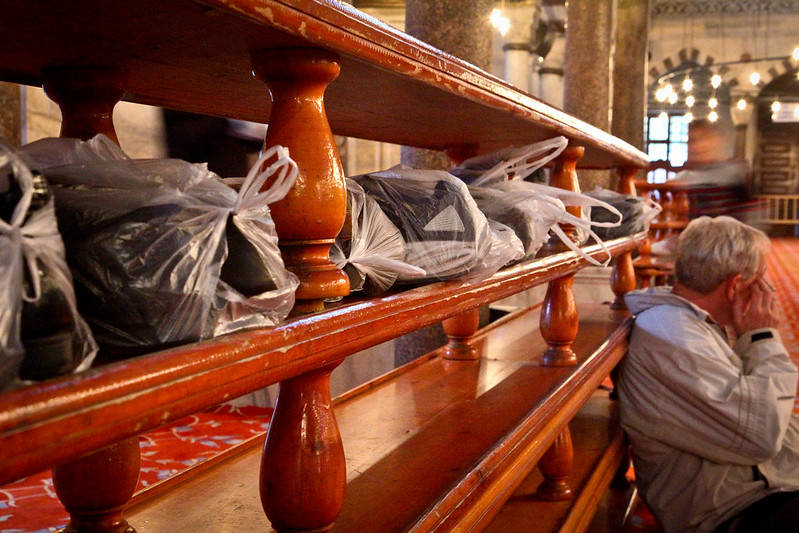If you are thinking about traveling through Turkey, or if you are just interested in learning more about Turkish customs, I offer you this short (and by no means exhaustive) list to summarize what I discovered about the different habits and customs of Turkey.
First of all, if you are invited into the home of a traditional Turkish family or even to your Turkish schoolmate’s place, the rule is that you can’t pass through the front door with your shoes on. Take them off! Indeed, it is really impolite to keep them on since you just walked down the dirty street outside. In France it’s also generally frowned upon to keep your shoes on inside. Nowadays though, in most homes, it’s not such a big deal as long as you don’t keep them on all of the time. This custom may be related to the Muslim tradition of taking off your shoes before entering a mosque. In September when I first arrived here, I once left some stuff in my friend’s room but totally forgot about my shoes … you can’t imagine what a big deal it was! 😉 Most of the timewhen you visit a Turkish family, you will have the pleasure of wearing all kinds of slippers… but let’s save this topic for later!
If you are invited into a Turkish home, it is actually impolite to come without a gift. Any little thing will really be appreciated. Sometimes when you enter someone’s home, your host might offer to put some “Eau de Cologne” (Kolonya) on your hands, as a sign of purity and respect. During the meal, they will encourage you to try almost every plate (and there will be lots, not just one dish like in France) and it is impolite to refuse. However, as far as I know, it is also rude to take too much from any one dish. At the end of the meal, a Turkish expression “Elinize sağlık” is generally used, which means literally “Health to your hands”. It is a polite way to thank the cook for spending so much time on the meal, especially if it was very good. It’s also pretty funny to hear it in other contexts. “Ayaklarınıza sağlık” which means “Health to your feet” can be said for instance if you had to walk a few kilometres to get somewhere.
Now, let’s talk about tea! Making and drinking Turkish tea is a real institution here. However, it is totally useless to buy a packet if you didn’t also buy the special Turkish teapot – trust me I tried, it was disgusting. Turkish people may drink 10 to 20 cups of tea a day … no actually I have no idea what the average really is. I’m sure that some people can drink 50 cups a day! It’s definitely a social institution; a moment when men chat with men and women chat with women, enjoying quiet discussions about their daily lives. The other day, I was taking a walk through the Grand Bazaar when a shopkeeper tried to sell me something. I answered him in Turkish. Surprised, he offered me a glass of tea. As long as you try to show your interest in the culture, and speak a few words of the language, locals are far more welcoming. Ah, and one last thing, don’t forget to put your spoon in your cup when you’ve had enough. If you are having tea with a Turkish family for instance, they may keep trying to refill your cup until you die … ha ha! 🙂
Now, let’s speak a bit about linguistic habits! Contrary to the French “bourgeoise” culture which commands us to address anyone that you don’t personally know as “Madame” or “Monsieur”; here you have the feeling that everyone is related in one big family. In fact, it’s really common when in a shop or on the street to hear a man calling a woman “big sister” (abla) and the reverse (abi). Regarding my own experience for instance, yesterday I just said “Have a good day” to the cashier in the cafeteria, and she answered naturally “You too my dear” (Sana da canım). Another funny thing is that Turkish people can have a real conversation sometimes almost without saying a word. For instance, to say “no”, there are 5 different ways such as lifting one eyebrow or jerking your head back. When you gently shake your head, you are letting the other person know that you didn’t understand something. You can also express your surprise by raising a hand up in front of you … and so on !
To conclude, let me just say that Turkish hospitality deserves its reputation. However we foreigners need to respect the local customs, such as those described above, in order to not abuse this kindness. Turkish people are not known for being shy, and I can attest to this from what I observed in my classes. Turkih students often loudly announce any disagreements they have, unlike French people who usually try to be quiet. As for next semester, I’ve found a flat in the town centre with two Erasmus friends. While there, I hope learn more about Turkish customs and practice speaking more Turkish.
See you (görüşürüz)!
Author: Maëlle Le Dru


